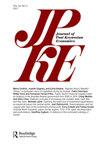现代联邦的道德风险
IF 1
3区 经济学
Q4 ECONOMICS
引用次数: 1
摘要
摘要反对向州政府提供财政援助的论点通常基于一种简单的道德风险论点:支持各州度过周期性衰退会鼓励它们超支。这一论点支持了主流财政联邦主义文献提出的政策建议。我认为,这些账目是基于对作为一名代理人在整个商业周期内的预算意味着什么的误解。基本的公司财务理论告诉我们,为了控制当期收入和支出的相对变动,必须能够设计自己的资本结构。美国各州政府在制度和宪法上被禁止设计自己的资本结构,因此,不能被判断为在整个商业周期中拥有预算代理权。我表明,财政金融文献中提出的道德风险问题是不合理的,并掩盖了第二个更重要的道德风险的问题。也就是说,联邦一级的政客们在州一级追求紧缩政策的同时获得政治回报,同时与任何政治、经济或社会成本或责任隔绝。第二个道德风险问题承认了一个简单的解决方案:向州政府提供基于触发因素的财政援助。本文章由计算机程序翻译,如有差异,请以英文原文为准。
Moral hazard in a modern federation
Abstract Arguments against providing fiscal aid to state governments usually rely on a simplistic moral hazard argument: supporting states through a cyclical downturn encourages them to overspend. This argument undergirds the policy recommendations made by the mainstream literature on Fiscal Federalism. I argue that these accounts are predicated on a misunderstanding of what it means to be an agent with respect to one’s budget over the business cycle. Basic corporate finance theory teaches us that in order to have control over the relative movement of income and expenditure in the current period, one must be able to design one’s own capital structure. US State governments are institutionally and constitutionally prevented from designing their own capital structures, and as such, cannot be judged to have budgetary agency across the business cycle. I show that the moral hazard problem presented in the fiscal finance literature is ill-posed, and obscures a second, more important problem of moral hazard. Namely, that politicians at the federal level reap the political rewards of pursuing austerity at the state level while remaining insulated from any political, economic, or social costs or responsibility. This second moral hazard problem admits of a simple solution: trigger-based fiscal aid to state governments.
求助全文
通过发布文献求助,成功后即可免费获取论文全文。
去求助
来源期刊

Journal of Post Keynesian Economics
ECONOMICS-
CiteScore
1.70
自引率
10.00%
发文量
23
期刊介绍:
The Journal of Post Keynesian Economics is a scholarly journal of innovative theoretical and empirical work that sheds fresh light on contemporary economic problems. It is committed to the principle that cumulative development of economic theory is only possible when the theory is continuously subjected to scrutiny in terms of its ability both to explain the real world and to provide a reliable guide to public policy.
 求助内容:
求助内容: 应助结果提醒方式:
应助结果提醒方式:


